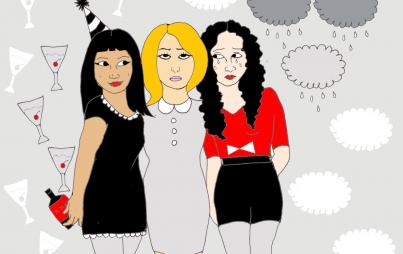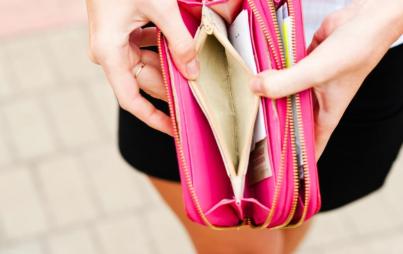
If you’re not currently poor, low-income, or broke, here’s what you can do this summer to support your friends and family members who might be.
Summer has always been my favorite season. I love the feeling I get in the pit of my stomach when I’m swimming, and I turn upward toward the sky, blinking at the sun, with the ocean carrying me. I’m at the beach every nice weekend and day off that I can be.
But summer is also exhausting if you’re poor, low-income, or even just regular broke. Summer means turning down plans day after day because you can’t afford cocktails on rooftop bars, sunset cruises, day trips to the amusement park, or even a day of parking at a public beach.
I grew up poor, so summers were often emotional and vulnerable times for me. It’s tough to admit that you can’t even pull together $10 for a cheap lunch out, or that you won’t be able to put in your share for the group vacation. And there’s nothing worse than knowing all your friends are hanging out somewhere awesome without you (or actually seeing it on Instagram, which wasn’t an option when I was a teenager), all because you didn’t have the cash to join.
If you’re not currently poor, low-income, or broke, here’s what you can do this summer to support your friends and family members who might be:
1. Find free or cheap things to do.
Is anything truly free? It’s challenging, but especially in the summer, it’s possible. I can’t tell you how often my friends and I just took long walks in the beautiful weather because none of us had any money. I still really love walking, and I think a big part of that is because I grew up poor — walking was how we got everywhere, and it was also one of the best completely free activities.
If you’re trying to plan things that won’t break the bank, consider what that really means. Twenty dollars here and there might not mean a lot when you have financial privilege, but to someone who’s living paycheck-to-paycheck, it can be the difference between buying groceries or paying a bill before they get more income.
Your poor and broke friends will sincerely thank you (and so will their wallets) if every suggestion you come up with doesn’t have a price tag attached to it.
2. Talk to your friends candidly about money, and empathize.
It is so hard to talk about money when you don’t have any.
I’m now in a place where I have more financial privilege than I did while I was growing up, and I know how that difference feels. I never wanted to bring up my finances (or my family’s finances) with my friends because many of them had parents with solidly middle-class incomes. They had savings accounts, retirement funds, and were buying their kids cars when they turned 16 or 18. Meanwhile, I was taking the bus to the library after school to print out my class projects because we couldn’t swing $100 for a home printer. I was seriously embarrassed, and pretty afraid my friends would just stop hanging out with me if they found out how poor I was.
If you’re someone who has financial privilege, tell your friends that it’s okay to talk about money. Make talking about money a comfortable subject (but never force someone into it!) that people feel they can bring up without judgment.
3. Offer to pay more than your fair share — or just do it.
This one is tricky because it’s so individual. When I was poor, my friends with more financial privilege were always offering to help ease the burden. They’d offer to pay for my dinner, drive me to an event, or buy me a ticket to something.
But it honestly sucks being the person who always can’t pay, who has to accept gifts and favors from everyone else. I often felt like a burden or a charity case, and that happens a lot when you’re the person who has less privilege in the situation.
You Might Also Like: 5 Tips For Making Grown-Up Friends
It’s helpful to talk with your friends and let them know that you love and value them, and you’re willing to do whatever you can to hear them out and understand their situation. Maybe that means not being so picky and counting exact change when you’re splitting the bill together; maybe it means inviting them out to lunch and telling them from the beginning it’s your treat. Maybe it means giving them a gift card someone gave you that you don’t want, or asking around to see if anyone needs a used air conditioner before you throw yours away.
Find out what makes your friends feel comfortable and totally supported, and do that.
4. Give your friends the opportunity to voice their concerns.
One of the most awkward scenarios, when you’re poor, is not having a plan. There were so many times when I’d be out with friends — walking around the city, at the mall, at the beach — and we’d make a spontaneous decision. “Let’s go to lunch here,” someone would say, or, “Do you want to go kayaking?”
A lot of the time, these spontaneous decisions would have a price tag involved. I had to quickly do mental math to figure out if a $12 kayak ride was in the budget or if this restaurant was reasonably priced, and by the time I realized I couldn’t afford it, my friends were halfway in the door or already signing up.
If you want your friends to feel included, give them the opportunity to think about any plans with as much notice as possible, and to voice any concerns they might have.
5. Don’t make your friends listen to all your complaints about money.
Everyone has the right to complain, and it can be a healthy way to release our energy when we do it with purpose. But if you can do one thing — don’t talk about your money problems all the time in front of your poor or broke friends.
There’s nothing more frustrating when you’re poor than hearing your friend whine about how much money she had to spend at her destination bachelorette party, or on their elite private arts education, or about how he had to downgrade his expensive vacation package to a slightly less nice one. Save those complaints for your friends and family who have a lot more financial privilege and similar economic backgrounds.
There might be exceptions to this — like if you’re going through something out-of-the-ordinary — but it’s best to test the waters carefully first and read your friends’ emotions before diving into a full explanation of your financial woes.
6. Reconsider your judgments and how you talk about money.
I can’t tell you how many times I heard things like, “It’s only $100!” or “Let’s go to this beach, it isn’t too expensive.” And the person saying it often had a wildly different idea of what $100 looks like to their overall budget, or what expensive means. This kind of language can hurt if you’re poor because it’s a reminder that what might be a lot of money to you is practically nothing to other people.
Try to withhold judgments and assumptions about other people’s financial situations, and consider how this shows up in your actions and words.
Instead, be as transparent as possible: Tell people early on how much money something will cost, if there are any hidden fees associated with it, and how much of the share you’re planning to pay (for example, if you’re splitting gas for a road trip, you can say, “I’m putting in $25”).
7. Realize there’s a difference between being broke and poor.
If you’re feeling tight on cash yourself, it can also be good to take a healthy step back from the situation and think about whether you’re broke or actually poor. There’s a big difference between finding out your electricity has been shut off in the summer because you couldn’t pay it (and now you have no air conditioning), and being tight for cash because you just took a big summer trip on an entry-level salary.
This is a big reason why, when I talk about money with people, I say things like “I’m historically low-income,” “I come from a low-income background,” or “I grew up poor,” because it’s not true anymore — I can’t consider myself poor. Due to a combination of white privilege, educational privilege, and the privilege of being raised just outside a major American East Coast city, I’m not in poverty anymore, but I remember starkly how it feels to wonder where your next meal will come from or if you’ll have an eviction notice waiting for you when you get home.
8. Donate some of your time and resources to help people with less privilege.
Honestly, the people who I’ve usually seen help poor people out of a financial emergency are other poor people. It’s almost always people with the least resources who have the community’s interests at heart and are willing to pitch in to make sure someone gets to the grocery store or has enough to pay their rent. I grew up watching my mom give money to the homeless people we passed on the street on the way to our apartment in the projects, or seeing my dad pick up a low-income family in his cab and offer to buy all their groceries.
Things won’t change unless people with more financial privilege start to do something. If you can afford to, seriously consider donating your time or money to those with fewer resources. Volunteer at a homeless shelter or a soup kitchen. Drop off some nonperishable items or fresh food at a women’s shelter or a place for sober housing. Give money to someone’s GoFundMe, Patreon, or PayPal account (and I know we all love to give to organizations, but giving to individuals can make an immediate difference too). Offer to give someone without a car or reliable transit a ride to the store. Pick up some extra fresh food at the farmer’s market and bring it to a shelter for queer and trans youth.








